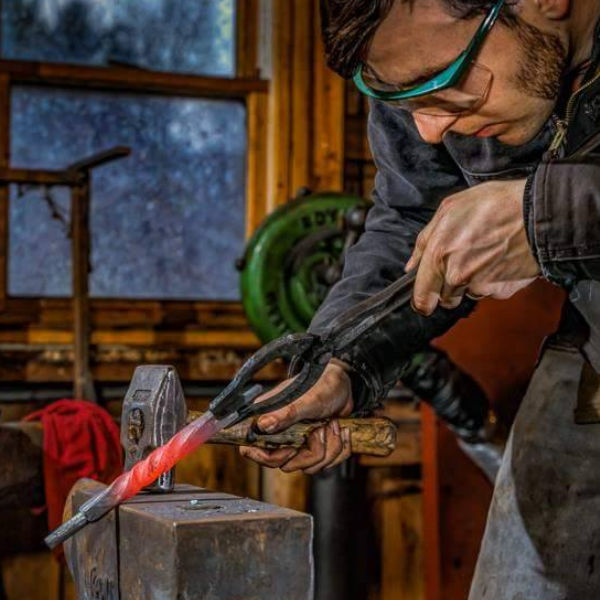Like woodworking or cobbling, blacksmithing seems like an old-time craft that has gone the way of the dodo. Do we even know what blacksmiths do? By definition, they are craftspeople who create usable objects out of iron or steel, generally by applying intense heat until the metal becomes pliable. At that point, hand tools, such as hammers, anvils, and chisels are used to shape the red-hot metal.
One might think of Vulcan, the god of fire, patron of metalwork and crafts, and welder to the gods in Roman and Greek (Hephaestus) mythology, a skilled artisan whose forge was a volcano. One most likely would not think of a 29-year-old college graduate, who also happens to be a second-generation blacksmith, making his living selling custom furniture and ornamental fences from his shop in Altamont, New York. (Also, online at New York Makers).
“Yeah, I wasn’t even sure I could make a go of it,” Noah Khoury, aka, the Helderberg Blacksmith, admits. “Blacksmithing doesn’t exactly provide a clear-cut path from college to viable career.”
But, it is still around; and it’s one of the oldest skilled crafts still practiced today. Evidence of blacksmithing has been found in Egypt, dating back to 1350 B.C. and is believed to have first been practiced by Hittite tradespeople, who eventually shared the techniques from people spread across Europe, from Greece to the Balkans.
Blacksmithing reached its apogee in the 17th and 18th centuries, relatively prosperous times that required the creation of both utilitarian and decorative iron for work and home. But the Industrial Revolution doomed the widespread practice of the trade with the introduction of machine-forged tools, which mechanized the creation of everything from hammers to farming equipment. The death knell for the blacksmithing industry was the advent of the automobile, which erased the blacksmiths’ last vestige of dependable income: the custom horseshoe.
While there is no longer a blacksmith on every busy city street, the trade is seeing a renaissance.
“I began learning the trade when I was seven,” Noah explains. “My father had a shop in the same building I’m in now. I still have a crate in my shop that reads ‘Noah’s helper,’ which is what I’d stand on so I could reach the anvil.”

Sadly, his father had to close the shop when Noah was in high school because there just wasn’t enough business. Ergo Noah’s quandary when applying to college.
“I knew I wanted to work as a blacksmith, but I didn’t think I could do it full-time,” Noah says. So he entered SUNY New Paltz and studied sculpture. But something was missing.
“I loved the artistry of it [sculpting] but I really wanted something that would help me develop practical skills,” he says. He heard about a branch of Tennessee Tech University called the Appalachian Center for Craft.
“Once I transferred there, my vision for the future was transformed,” he says. “I was on a peninsula, in the middle of a lake, with 24/7 access to a welding shop.”
His father was self-taught, and Noah says that he believes that the formal training from school gave him a leg-up technically. It almost certainly enabled him to cultivate a broader perspective on the industry, and figure out how to carve out a viable future for himself.
Unlike winemaking, home-building, painting, or other forms of practical and useful artistry, much of the core technology, tools, and techniques utilized by blacksmiths has remained the same. In the hands of some, the craft of smithing becomes an art; for creators like Noah, that can make the difference between cultivating a passion project and forging an actual career.
Not that he doesn’t have his share of pay-the-bill practical projects.
“For every custom ironwork fence based on an obscure 18th century design that I’m creating for homeowners, I’m also cranking out bases for giant pizza ovens,” he says. “But honestly, it’s all great. Sometimes I can’t believe I can pay my bills doing something I love so much.”

And sometimes we can’t believe we have the practical, palpable result of a craft first forged in ancient Egypt, right here in our modern home.
Shop more of Noah's products here > Helderberg Blacksmith.


Leave a comment